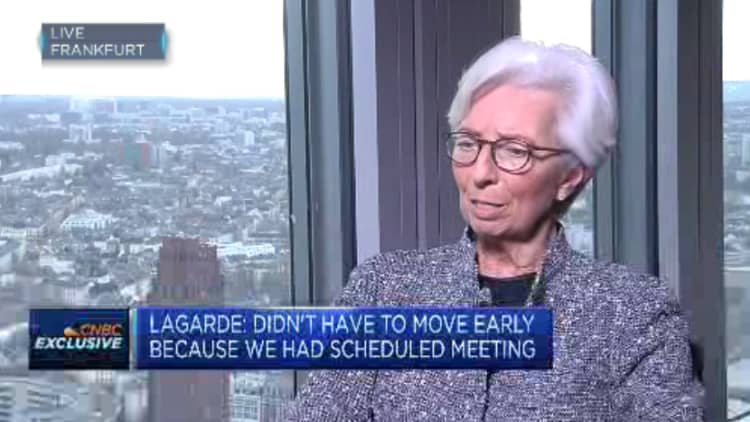Italian borrowing costs fell sharply Thursday morning as investors reacted to a massive new bond-buying program from the European Central Bank (ECB).
The ECB on Wednesday evening announced a 750 billion euro ($820 billion) asset purchase program in an effort to help mitigate the impact of the coronavirus outbreak, as the death toll in Europe continues to rise.
The central bank said that it would buy public and private securities to counter the "serious risks" of the coronavirus. The so-called Pandemic Emergency Purchase Program (PEPP) will last until the end of the year.
The central bank had been criticized since Lagarde last week told a press conference that the bank's role was not to close the spread in sovereign debt markets. Her comments sent Italian borrowing costs up as a result. Her predecessor, Mario Draghi, reassured financial markets in 2012 — the height of the sovereign debt crisis — that the ECB would do "whatever it takes" to save the euro.
However, investors responded positively to the ECB's latest coronavirus package. The yield on the 10-year Italian bond dropped to as much as 1.542% Thursday morning, having traded at 2.5% on Wednesday. Yields move inversely to bond prices. The move lower in yields means investors are buying Italian bonds, which indicates confidence in the country's ability to pay them back.
"Extraordinary times require extraordinary action. There are no limits to our commitment to the euro. We are determined to use the full potential of our tools, within our mandate," ECB President Christine Lagarde said Wednesday on Twitter.
The coronavirus, which started in China in late 2019, has brought the major euro economies to halt, with Italy, France, Spain and Belgium in total lockdown. Data has also shown that the virus has infected and killed more people in Europe than in China, The New York Times reported.
The new asset purchase program will also include Greek securities. Greek government bonds have not featured in the central bank's previous asset purchase programs as they did not have enough investment credibility in the wake of the sovereign debt crisis.
"We couldn't hope for more. The inclusion of Greece and corporate commercial paper were the cherries on the QE (quantitative easing) cake," Frederik Ducrozet, senior economist at Pictet Wealth Management, said in an email Wednesday.
"Provided the fiscal response continues to build up, this looks like a game-changer for the euro area economy and markets," Ducrozet added.
The ECB surprised markets a week ago by not cutting interest rates as a way to boost economic activity during the coronavirus outbreak. Instead, the ECB unveiled new support to bank lending and expanded its asset purchase program by 120 billion euros ($135.28 billion).

"The fact that the euro zone has finally come to terms with the magnitude of the crisis should cushion the downswing and is an important prerequisite for a swift rebound," Carsten Brzeski, chief economist at ING Germany said in note about the latest coronavirus package.
The different euro area governments have also put forward fiscal stimulus measures to reduce the fallout from the virus. France, for instance, has pledged 45 billion euros to support businesses.
"As so often in the past, it took the euro zone, and this time around also the ECB, a while to react. The policy reactions did not come with one big coordinated swoop, but the package of government stimulus, liquidity and guarantees combined with Lagarde's 'whatever it takes' as it stands right now is strong," Brzeski added.


